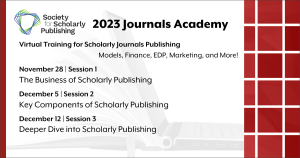SSP’s first Journals Academy—a bootcamp for scholarly publishing professionals—will take place online in a series of three, three-hour workshops, starting Tuesday, November 28. This intensive course will become an annual offering as part of the suite of educational materials created by the SSP Training Taskforce.
The curriculum will be immersive and interactive, designed to provide an opportunity for virtual attendees to gain a high-level understanding of the scholarly publishing industry, while they also network and establish themselves as a cohort within the SSP community.
Here’s a glimpse of what will be covered during the Academy:
Who is the intended audience, and why should they attend?
The Journals Academy will appeal to early and mid-career professionals in scholarly publishing, and will expose attendees to the entire ecosystem of the industry. It would also be useful to EICs of journals who are interested in learning more about the business of scholarly publishing.
What can attendees expect?
Jeff Mahoney (American Academy of Pediatrics), Chair of the SSP Training Task Force, emphasizes that this bootcamp will be immersive and interactive. He wants you to know that it is not the type of webinar where you work on one monitor and half listen while Zoom runs on the other. Expect to be… engaged.
Why is the Academy is needed?
The Academy will give you a 10,000 foot view of the scholarly publishing industry. This high-level understanding often comes after years of experience, so participants in the Academy will have a head start in their careers. As 2023 nears the end, this is also a last-chance to check off any outstanding goals concerning professional development.
Week 1 will start with an overview of the business of scholarly publishing. It will begin with a discussion of different journal business models, focusing on the evolution from traditional models to the more innovative models being used today. You will also learn about the financial aspects of academic publishing, which is a topic that is unfamiliar to many people in the industry, many of whom come to it with a liberal arts education. However, speaker Mercedes Simoncelli (Wolters Kluwer) believes that if you don’t understand the financial goals of your organization, then you don’t understand the goals of the organization. Do you know what a P&L is and how it relates to you? If not, you will find out.
Week 2 will cover the key components of scholarly publishing. The day will begin with an overview of the basic roles involved in scholarly publishing and the synergy between the people who work on peer review and those who produce the published work. Miranda Walker (Wolters Kluwer), one of the speakers on this topic, will discuss the various job titles that fall under these role types and the types of employers you might work for in these roles. You will also learn about marketing tactics, journal launches, and social media, along with tools such as market research and surveys. The day will close out with a discussion of diversity, equity, inclusion, and accessibility in the scholarly publishing industry.
Week 3 will take a deeper dive, starting with an exploration of data-driven decision-making using the suite of databases and tools available to publishers, and will conclude with some of the hottest topics in scholarly publishing, including a presentation about AI and LLMs, and a discussion on how to have a resilient career in a rapidly changing industry.
At the end of the course, you will receive a certificate of completion and a new cohort of peers who will be sources of information and networking throughout your career. Register now!
News contribution by SSP member Gwen Weerts. Gwen is a Journals Manager for SPIE and Editor-in-Chief of Photonics Focus.



Join the Conversation
You must be logged in to post a comment.